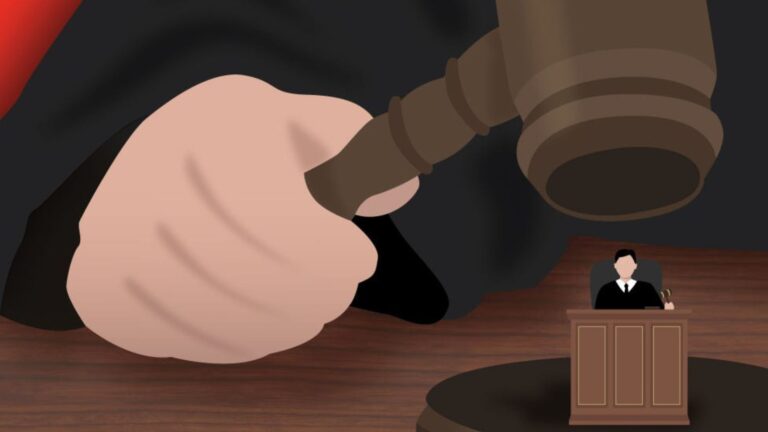The moment you hear the term ‘Nepotism’, what is the first thing that comes to your mind? I bet, you may have thought about Bollywood or Politics, where the children of an actor/actress thoughtlessly becomes actors/ actresses and the children of a politician becomes the President of their political party without any internal elections.
But the term ‘Nepotism’ is not only limited to these particular fields; it is also very familiar in the field of ‘Judiciary’.
Belonging to a family of Judges gives one a sure shot at being the next in line. The prevalent norm is “Nepotism and Casteism,” wrote Justice Rang Nath Pandey of the Allahabad High Court in a letter to Prime Minister Narendra Modi.
Also, when Prime Minister Narendra Modi talked about nepotism during his address on the 76th Independence Day (he did not specifically mention the term ‘Judiciary’), people often think that he is only talking about the political field, which is not true. He said, “Unfortunately, that evil in the political field has nurtured nepotism in every institution of India. Nepotism is engulfing many of our institutions. Because of this, the talent of my country suffers. The strength of my country suffers. Those who have the possibility of opportunity lose it because of nepotism. This also becomes the reason for corruption, so that he does not have any relatives to support them to get a job, they prefer to buy their space in the sector.”
Also, Former Law Minister Kiren Rijiju, during his tenure, had blamed the “Collegium System” several times for high pendency of cases and judicial vacancies. He said that “The government took many steps to reduce pendency of cases, but the government has a very limited role in filling vacancies of judges. The collegium chooses names, and apart from that, the government has no right to appoint judges.”
The appointment of judges to the Supreme Court (SC) and High Courts (HC) has been mandated in Articles 124(2) and 217(1) of the Constitution, respectively.
The provisions provide that the power to appoint the judges vests with the President, “in consultation” with the Chief Justice of India (CJI) for the SC, and “in consultation” with the CJI, the governor of the concerned state, and the Chief Justice (CJ) of the concerned HC for HC appointments.
According to many data and reports, 38% of the incumbent judges have deep family connections in the Judiciary and Government, which means 12 of the 32 Judges are either related to a former Judge or to a political leader. It is not just the Supreme Court judges; the data of High Court judges also gives rise to suspicions of nepotism.
Looking at the scenario of the Collegium System, one may be apt to think and believe that the collegium system is fostering and advancing not only those with merit but also possibly those with family connections in the judiciary.
The list of Judges who have connections in the Judiciary/Politics:
- U. U. Lalit – Former Chief Justice of India, Son of UR Lalit, former Addl. Judge of Bombay High Court and Senior Counsel in the Supreme Court
- Current Chief Justice, Dhananjaya Y. Chandrachud – Son of Yeshwant Vishnu Chandrachud, longest service Chief Justice of India.
- Sanjay Kishan Kaul – His great-great-grandfather, Raja Suraj Kishan Kaul, was the Revenue minister in the Regency council of the princely state of Jammu and Kashmir. His great-grandfather, Sir Daya Kishan Kaul served as the finance minister of Jammu & Kashmir state. His grandfather, Raja Upinder Kishen Kaul, had a distinguished career in public service.
- K. M. Joseph – Son of K. K. Mathew, a Judge of the Supreme Court of India
- Dinesh Maheshwari – Son of prominent Jodhpur Advocate Ramesh Chandra Maheshwari
- Sanjiv Khanna – Nephew of SC Judge Hans Raj Khanna
- Bhushan Ramkrishna Gavai – Son of R.S.Gavai, former MP and Governor
- Krishna Murari – Nephew of GN Verma, a prominent lawyer and President of the High Court Bar Association
- Vikram Nath – 4th Generation lawyer in the family
- B. V. Nagarathna – Daughter of former Chief Justice of India, E. S. Venkataramiah. In line to be Chief Justice.
- P. S. Narasimha – Son of a judge, Kodanda Ramayya
We mostly talk about the nepotism in Bollywood and Politics but we never focus or discuss about the presence in the Judiciary, as the judiciary is one of the most important pillars of our democracy, there should be a transparency while appointing the judges.
In 2014, with the Bharatiya Janata Party (BJP) government coming to power, the National Judicial Appointment Commission Act, 2014 (NJAC) was passed.
As per the proposed act, the NJAC would be a six-member group consisting of the CJI, two senior judges in line, the Law Minister and “two eminent persons”, chosen by a committee of the CJI, the Prime Minister and the Leader of Opposition.
But the NJAC was challenged in the in Supreme Court Advocates-on-Record (Association Vs Union of India).
The majority declared that NJAC is unconstitutional for violating “judicial primacy”, thereby violating the basic structure of the Constitution.
The minority opinion, given by Justice Chelameshwar, is also essential: distinguishing between the basic feature and the basic structure of the Constitution, he stated that judicial independence is not a part of the basic structure of the Constitution.
In a nutshell, Justice A K Sikri has informally stated that while appointing judges to the higher judiciary, “Justice A K Sikri has informally stated that while appointing judges to the higher judiciary, “far from the scientific study of candidates we go by our impression”.
From my personal standpoint, the NJAC presented the best way out as the appointments committee was a six-member group consisting of the CJI, two senior judges in line, the Law Minister and “two eminent persons”, chosen by a committee of the CJI, the Prime Minister and the Leader of Opposition.

